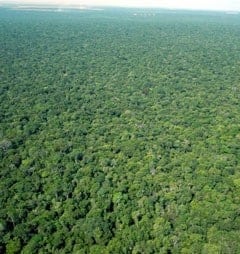The rate of deforestation in the Brazilian Amazon has declined.
An international team of scientists, including one from Virginia Tech, reviewed published research about policy interventions and commodity market effects, and determined that positive incentives for farmers, counties, and states can do as much to preserve forests as public policies that call for penalties.
“The challenge now is to build upon this progress,” they report in anarticle in the June 6 issue of Science. “Some immediate and simple positive incentives for responsible, low-deforestation farmers could be established without major new policies or markets for ecosystem services.”
Suggestions include simplified regulatory requirements or discounts on environmental licensing procedures, better terms on pre-harvest packages from commodity suppliers, and lower interest rates or better terms on loans from banks for legally compliant landholders.
“Still, deforestation is only one of the threats to the Amazon region,” said Leandro Castello, assistant professor of fish and wildlife conservation in the College of Natural Resources and Environment at Virginia Tech, a co-author of the review article.
“There is an urgent need to shift the Amazon conservation paradigm to encompass the freshwater ecosystems, which are being rapidly degraded by deforestation and construction of hydroelectric dams,” said Castello, who is first author on one of the articles reviewed. “We now know that freshwater ecosystems could be managed through policy and supply chains in a manner similar to that which is being done with deforestation.”
Castello, whose specialty is Amazon fisheries, is leading a team from the Woods Hole Research Center and the University of California Santa Barbara, funded by NASA,assessing the impacts on wetlands and river ecosystems caused by extreme climatic eventsin collaboration with Brazilian scientists.
The College of Natural Resources and Environment at Virginia Tech, which consistently ranks among the top three programs of its kind in the nation, advances the science of sustainability. Programs prepare the future generation of leaders to address the complex natural resources issues facing the planet. World-class faculty lead transformational research that complements the student learning experience and impacts citizens and communities across the globe on sustainability issues, especially as they pertain to water, climate, fisheries, wildlife, forestry, sustainable biomaterials, ecosystems, and geography. Virginia Tech, the most comprehensive university in Virginia, is dedicated to quality, innovation, and results to the commonwealth, the nation, and the world.


